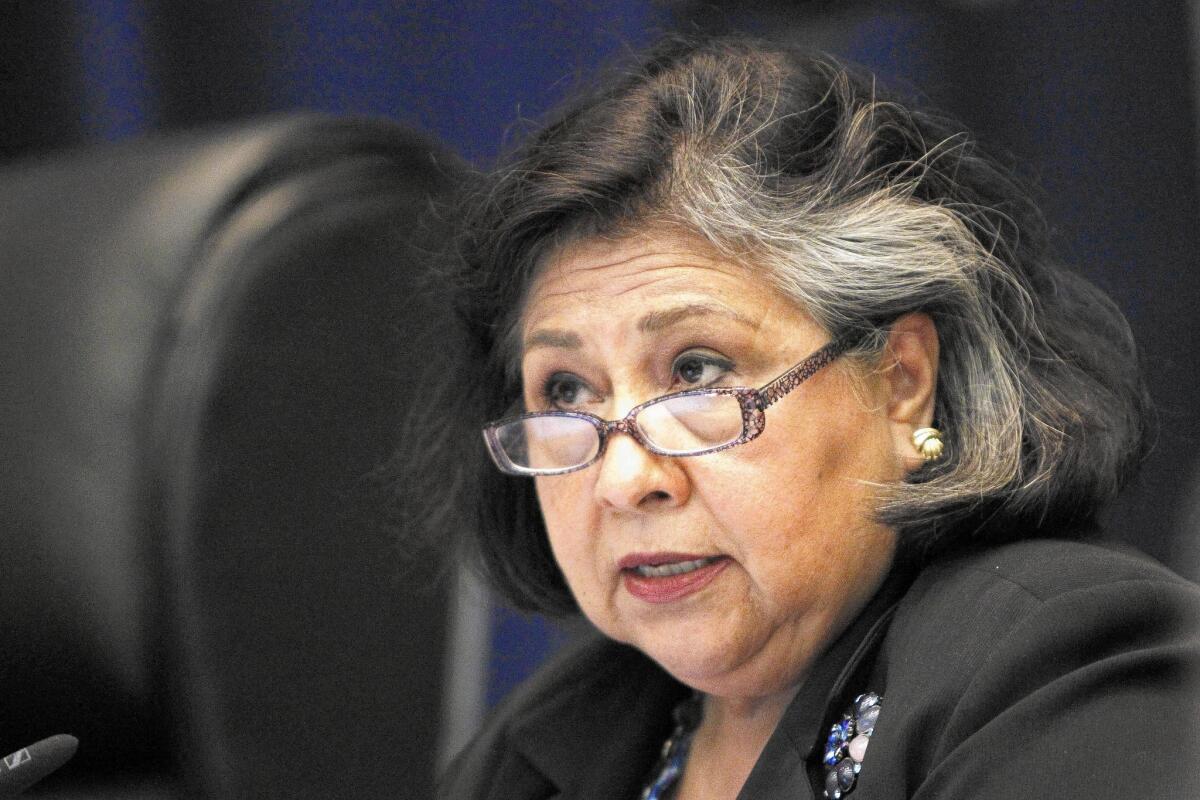Sheriff’s patrol levels in unincorporated areas found lacking

Los Angeles County Supervisor Gloria Molina and her staff last year started monitoring the number of sheriff’s patrol cars in East Los Angeles and other unincorporated areas in her district. They found that often there were not as many on the streets as the sheriff had agreed to provide, especially on the weekends, when calls for help usually increase.
In some cases, they found that the department would bring in extra staff during the week to balance out the lower staffing on the weekends.
“I just wanted to get what I was paying for,” Molina said in an interview. “You see the high crime rates in these areas, and the patrol cars weren’t there.”
At the supervisors’ meeting Tuesday, a contrite Assistant Sheriff Michael Rothans acknowledged that there was a problem with weekend staffing, which he said he had only learned about recently. But he said the department had taken measures to alter a scheduling practice that had put more deputies on patrol during quieter weekdays — a situation that he said stemmed in part from a freeze on overtime, which was lifted in July.
In an effort to improve response times, supervisors agreed to set aside $12.4 million to increase the number of deputies patrolling unincorporated areas. But they decided to hold the money until sheriff’s officials verify that they have fixed scheduling practices that have led to more deputies being deployed during weekdays than on busy weekend nights.
The additional funding would add 67 deputies to the unincorporated areas, as a move toward restoring staffing to pre-recession levels. An additional 56 positions could be added next year.
A study of sheriff’s response times around the county found that those for both routine and emergency calls had grown worse in some unincorporated areas from 2010 to 2013. In East Los Angeles, the average time to respond to emergency calls remained 4.3 minutes — one of the best in the county’s unincorporated areas — but response time for routine calls had increased from 58.4 to 68.4 minutes. In unincorporated areas around Malibu, emergency response times increased from 9.8 to 10.8 minutes and routine calls from 34.5 minutes to 42.2 minutes.
Jeffrey Steck, president of the deputies’ union, called the anticipated funding increase “fantastic” and said deputies want to be able to respond quickly to calls.
“I would hope that the department would quickly get that report to her and get the funding to put those cars back out in the field.”
The proposal to increase funding for sheriff’s patrols came as part of a mid-year budget review that revealed that $368 million from the previous year was still available and the county projected an $80 million increase in sales and property tax revenue.
The supervisors also agreed to set aside $20 million for new diversion programs for mentally ill offenders and $77 million for dozens of building projects and repairs to county facilities.
And the board gave final approval to a controversial set of fiscal policies that would require a super-majority vote — at least four of its five members — to approve future salary increases for county workers. Labor unions and Sheila Kuehl, one of the candidates vying to replace termed-out Supervisor Zev Yaroslavsky, have criticized the new policy as undemocratic and an attempt to tie the hands of incoming board members who are seen as potentially more labor-friendly than their predecessors.
Affordable housing advocates and developers objected to a separate portion of the policies that deals with how the county will spend money that would have gone to redevelopment agencies before the state dissolved them in 2012. The policy allocates much of the added revenue to capital projects, but does not specify how much should go to building affordable housing projects, which developers said have declined since the dissolution of redevelopment.
County Chief Executive William T Fujioka said the new policy would not preclude the county from setting aside money for affordable housing, and pointed out that it had set aside $80 million for the purpose over the last couple of years.
Times staff reporter Cindy Chang contributed to this report
Follow @sewella for more news about L.A. County government
More to Read
Sign up for Essential California
The most important California stories and recommendations in your inbox every morning.
You may occasionally receive promotional content from the Los Angeles Times.











